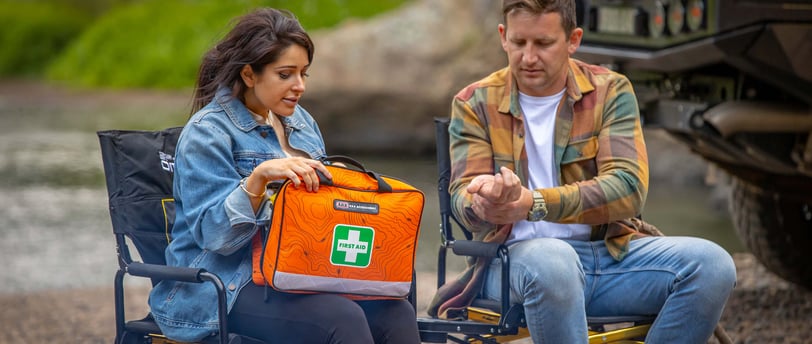Essential First Aid
Off Grid Camping Requirements
Geaster
7/22/20233 min read


Essential First Aid Requirements for Off-Grid Camping in the Australian Bush
Embarking on an off-grid camping adventure in the Australian bush can be an exhilarating and fulfilling experience. However, it's important to prioritize safety and be prepared for any unforeseen emergencies that may arise. When medical assistance is not readily available, having the right first aid supplies and knowledge can make a significant difference. In this blog post, we'll explore the essential first aid requirements for off-grid camping in the Australian bush, ensuring you can handle potential emergencies with confidence.
Comprehensive First Aid Kit: A well-stocked and comprehensive first aid kit is the foundation of your off-grid camping safety. Make sure your kit includes essential items such as adhesive bandages, gauze pads, antiseptic wipes, adhesive tape, tweezers, scissors, a CPR mask, disposable gloves, and a digital thermometer. Additionally, consider including items specific to your needs, such as insect repellent, sting relief, and sunscreen.
Medications and Prescriptions: If you or anyone in your camping party requires regular medications, ensure an ample supply is packed. It's advisable to carry an extra week's worth of medication in case of unexpected delays. Keep medications properly labelled and store them in a cool, dry place. If you use prescription medication, carry a copy of your prescription as well.
Emergency Communication Devices: When venturing into remote areas, it's crucial to have reliable communication devices. Carry a satellite phone or a Personal Locator Beacon (PLB) to reach emergency services if needed. Ensure you understand how to use these devices before your trip and keep them in a readily accessible location.
Knowledge and Training: Having basic first aid knowledge is invaluable in emergency situations. Consider enrolling in a first aid course that covers outback or remote area first aid. This training will equip you with skills such as CPR, wound management, and snakebite management specific to the Australian bush. Familiarize yourself with common injuries and ailments encountered in the outback, such as dehydration or heatstroke, and learn how to respond appropriately.
Snakebite and Insect Bite Management: Australia is home to some venomous snakes and insects, making snakebite and insect bites a potential risk when camping in the bush. Carry a snakebite compression bandage and insect repellent suitable for the local environment. Learn how to identify venomous snakes, understand snakebite first aid protocols, and know how to administer appropriate treatment until medical help arrives.
Hydration and Heat-Related Illnesses: Australia's climate can be harsh, especially in remote areas. Stay hydrated by carrying ample water supplies and regularly drinking fluids. Be aware of the signs and symptoms of heat-related illnesses, such as heat exhaustion and heatstroke, and take necessary precautions to prevent them. Pack electrolyte replacement drinks, wide-brimmed hats, and lightweight, breathable clothing for protection against the sun.
Navigation and Emergency Escape Routes: Before setting off on your off-grid camping adventure, thoroughly research the area and make sure you have access to a detailed map of the region. Familiarize yourself with potential emergency escape routes in case of severe weather conditions, bushfires, or other unforeseen circumstances. Carry a compass, a topographic map, and a GPS device to aid navigation and ensure you can find your way back to safety if necessary.
Off-grid camping in the Australian bush offers a unique opportunity to connect with nature, but it also requires careful preparation and consideration of safety measures. By equipping yourself with a comprehensive first aid kit, essential medications, communication devices, knowledge, and training, you can confidently handle emergencies that may arise during your adventure. Remember, prevention is key, so prioritize safety, stay informed, and enjoy your off-grid camping experience knowing you're well-prepared for any situation that comes your way.
(Disclaimer: This blog post provides general information and recommendations and should not be considered medical advice. Please consult with a qualified healthcare professional for specific medical concerns or questions.)
